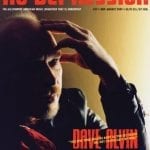Hello Stranger from Issue #52
The connective tissue of each issue tends to reveal itself only when the magazine is nearly done and the meaningful choices have already been made. And so we are somewhat surprised to see the extent to which blues has crept into these pages this time out.
But not that surprised. Twenty-seven years ago, when I first began spending more money than was prudent on music, it was clear that if one wished to understand rock ‘n’ roll, if one wished to be heard Saturday afternoon at the used record store chatdown, one had to be conversant in the blues.
This was not easily done, for blues records did not turn up often in the used bins, and were not stocked in great numbers by most retailers. And so one tended to buy, largely on faith, albums — of any vintage — by artists who had been covered by the Spencer Davis Group, or Peter Green’s Fleetwood Mac, or George Thorogood.
Even then, one did not admit to liking Thorogood when among the collecting elite. Nevertheless, his second album, 1978’s Move It On Over (probably the first album to be given me by a member of the music industry), led inescapably to the music of Hank Williams, Johnny Cash, Elmore James, Bo Diddley, and Brownie McGhee. I ate a lot of Top Ramen back then, and remain grateful to Mr. Thorogood for the diet.
It seems unlikely that today’s precocious youth find their music draws them into such distant history. Maybe as far back as Grandmaster Flash or the Clash or Black Sabbath, maybe even still to Johnny Cash, but the days of the guitar hero and the adoration of Robert Johnson seem largely past. And I fear the pleasures of Sleepy John Estes and Blind Willie Johnson are now as obscure as my father’s fondness for Benny Goodman and Glenn Miller once were to me.
Maybe not. But the audience for the blues today is aging (Martin Scorsese’s public television CPR seems to have done little to change that), and far too few of the contemporary blues artists whose music comes my way have anything remotely original to say. Which, in passing, is why I was so thoroughly delighted to discover Otis Taylor, and embarrassed to find the man had made six albums by the time I stopped to listen.
Because ND is a kind of roots music magazine (whatever that is), there have been occasional whispered charges that our slender coverage of blues was inextricably tied to the implicit racism within country music, and all that rot.
No.
In the winter of 1981 I took a course at the University of Washington, taught by an ineffectual psychologist, titled “The Poetry Of The Blues.” It wasn’t much of a class, but it did encourage more record buying (in the name of higher education), and the reading list was first-rate: LeRoi Jones (whose Blues People remains one of the four or five best and most incendiary books written about music), Albert Murray, Peter Guralnick, Samuel Charters, and William Farris. And I came to know a little of a magazine called Living Blues, for which I have enormous respect.
So when it came time to start No Depression in 1995, we felt the blues were more than adequately served already, and that nothing good could be accomplished by competing with such a venerable and venerated institution for readers or advertisers. Though Living Blues is now published by the University of Mississippi and is no longer a private enterprise, I still feel much that way.
At the same time, it’s pointless to talk about the good music being made in our carefully undefined world without paying attention to Corey Harris or Chris Thomas King or Otis Taylor; it’s impossible to miss Dave Alvin’s nod to the bluesmen who had so much to do with his music on his new album, Ashgrove; and we cannot honor Muddy Waters too often.
So, for at least the fifty-second time, a reminder: It’s about the music (and, yes, the context in which it’s made). There’s no master marketing plan behind this magazine, there’s no orthodoxy requirement (hell, Peter and I rarely agree on each issue’s story list, and that’s still much of the fun — at least for me), and there’s absolutely no color barrier. We started this magazine nine summers back to write about the music we love, whatever that may be.
Thanks so much for coming along for the ride, and bringing your friends.




